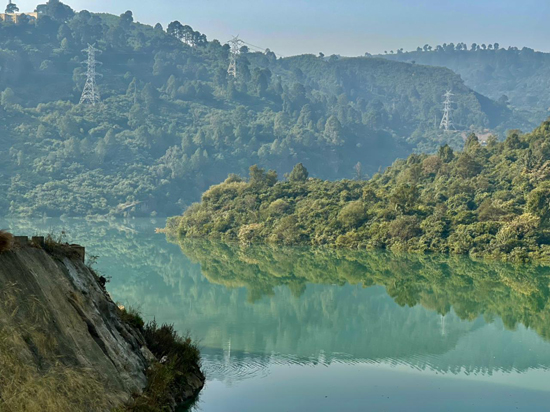Biodiversity protection lies at core of Karot Hydropower Project
By Moaaz Awan | chinadaily.com.cn | Updated: 2022-02-16 11:21
The leadership of both Pakistan and China are committed to a green, clean and sustainable future for their countries. Pakistan’s prime minister has termed the present decade the “Decade of Dams”, where 10 major dams are under construction. The dams include Diamer-Bhasha Dam, Mohmand Dam, Dasu Hydropower Project, and Kyal Khwar Dam. These projects are scheduled to be completed one at a time, and are complementing other hydropower projects under the the framework of the China-Pakistan Economic Corridor (CPEC).
The first hydropower project under CPEC, the 720mw Karot Hydropower Project, is being developed by one of the world’s largest renewable energy companies, China Three Gorges, on Jhelum River, straddling AJK and the province of Punjab, falling in Tehsil Kahuta in Punjab and District Kotli, in AJK.
When completed, the power plant will generate 3.2 billion kilowatt-hours of electricity, meeting the power needs of 5 million people. It will also reduce 3.5 million metric tons of carbon emissions annually and save around 1.4 million tons of standard coal equivalent each year, which as a result will effectively alleviate local power shortages and spur economic growth.
For the management of environmental and social impacts associated with the development of the project, an Environmental & Social Impact Assessment was carried out in line with the International Finance Corp (IFC) requirements as well as those of national laws and approved by the environmental protection agencies of AJK, Punjab and IFC.
To mitigate and protect the biodiversity of the project area, a comprehensive Biodiversity Management Plan (BMP) was developed for construction and operation stages of the project in line with IFC’s performance standards and approved by the Government of Punjab and AJK for implementation. The plan addresses regional biodiversity concerns and focus to achieve “No Net Loss” in the aquatic fauna under the International Finance Corp’s Performance Standard 6.

Going forward with the theme of a green and sustainable construction of CPEC. And knowing the value of the biodiversity, the Karot Project developers are striving to protect two nearby national parks: Azad Pattan National Park and the Murree-Kahuta-Kotli Sattian (MKKS) National Park.
These two national parks are included in the catchment area of the reservoir of the Karot Hydropower Project. Mansoor Khan, manager of the Karot Project looking after environmental aspects, said that his ambition is to work for the protection and conservation of biodiversity at Karot and its adjacent areas.
Overall, major components of the plan include protecting the project area through a Watch & Ward System; developing Sediment Mining Management activities, and developing national Parks Management Plans through an inclusive implementation strategy that includes government departments, Karot Project, and most importantly, the local community. The International Union of Conservation of Nature (IUCN) is engaged to implement the Biodiversity Management Plan. IUCN has a presence worldwide with 50 offices and runs projects all around the world. The agency is a leader in environmental work in the country at both policy and community levels, working toward a sustainable future.

Hydropower projects are labor-intensive projects. During the Karot Hydropower Project’s peak construction period, there were thousands of Pakistani and Chinese workers on the project. Having thousands of employees working on-site and on a vital water source for the people of Pakistan, while ensuring that human activity does not disturb the ecology of the water, is a challenging but essential task in environmental protection. To achieve minimum ecological effect due to human activity, Karot has installed wastewater treatment equipment and hired a specialized company to collect solid waste to ensure its proper disposal.
The conservation of nature and green infrastructure development is a global development path. This path is also aligned with the green and high-quality development of the Belt and Road Initiative. Keeping in mind the expectations of the people of Pakistan, the Karot Project is pursuing its best endeavors to promote environmental and biodiversity protection at the project.
The author is an observer and a researcher at Tianjin University. His research interests include China Pakistan Economic Corridor, the Belt and Road Initiative, and Shanghai Cooperation Organization.
The opinions expressed here are those of the writer and do not represent the views of China Daily and China Daily website.
If you have a specific expertise, or would like to share your thought about our stories, then send us your writings at opinion@chinadaily.com.cn, and comment@chinadaily.com.cn.
























